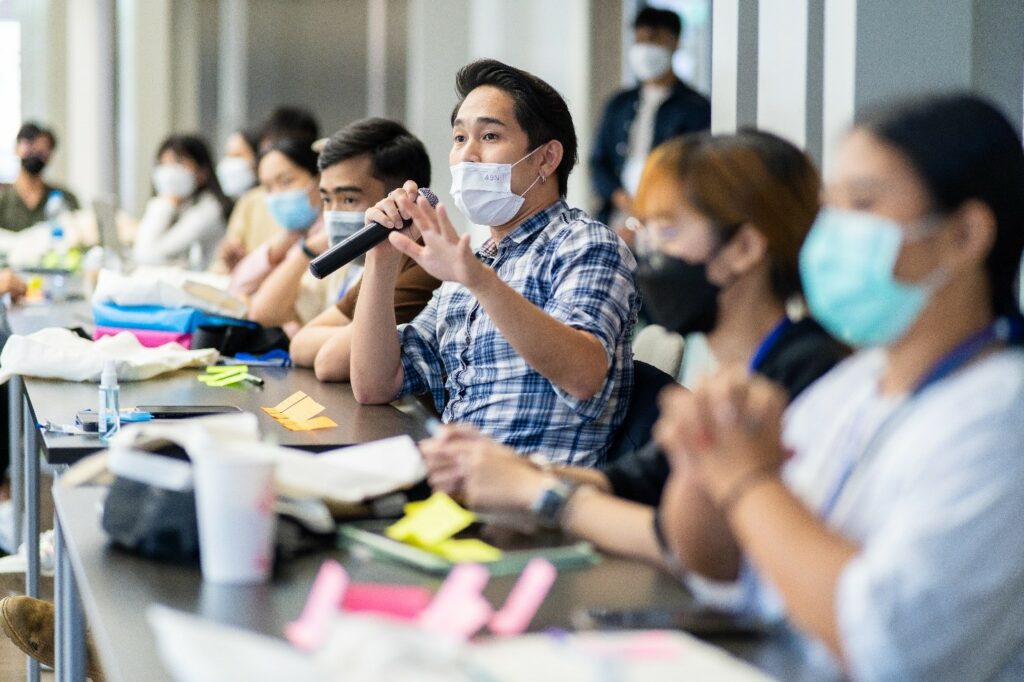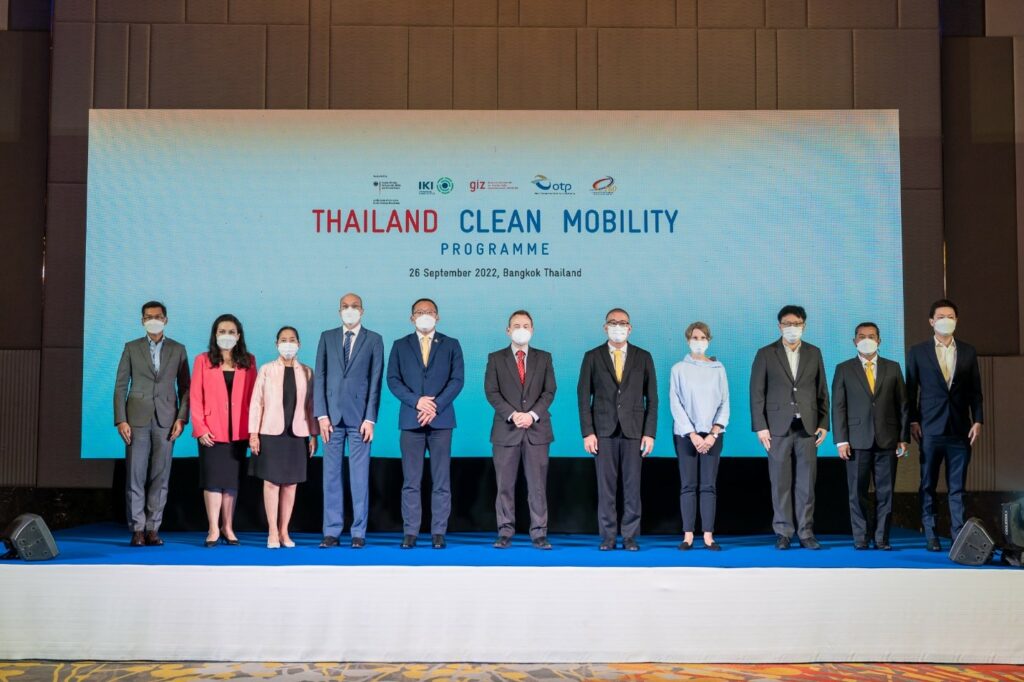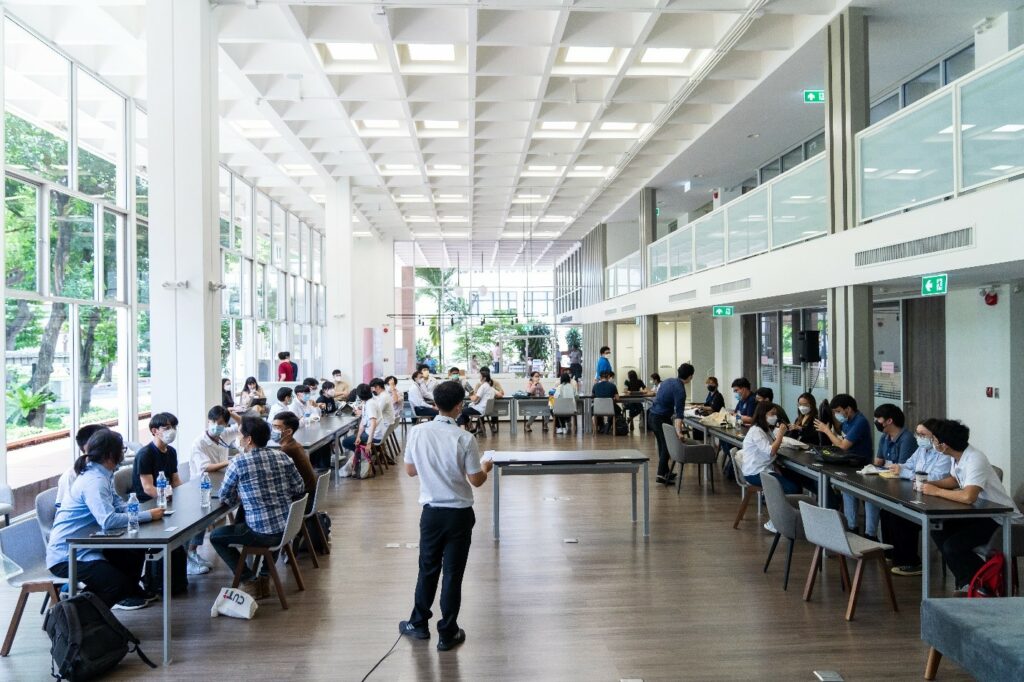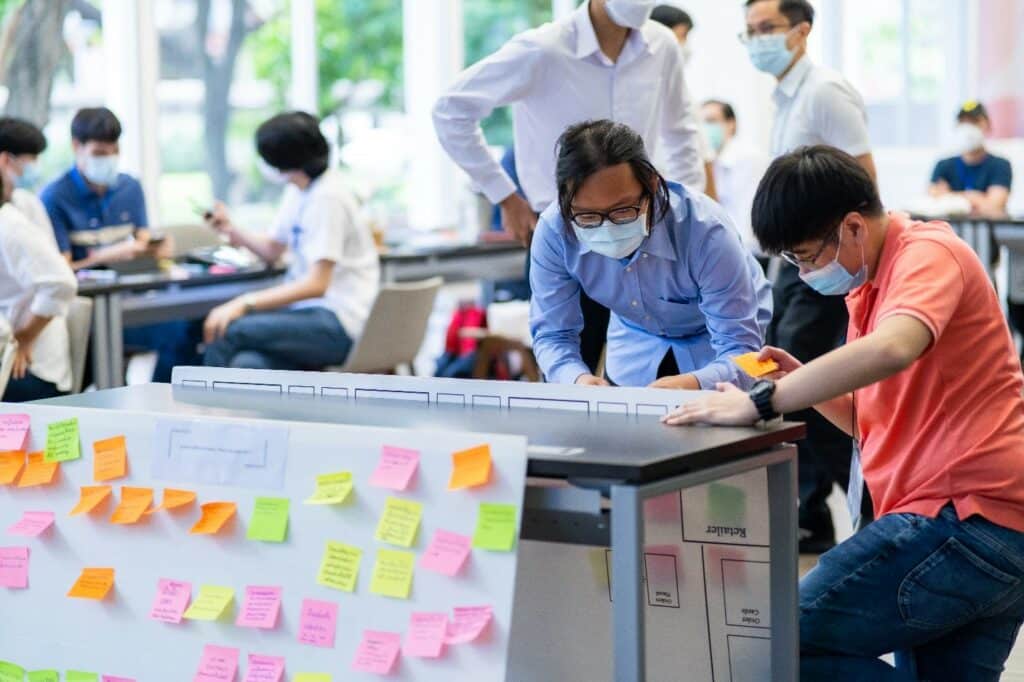
This article is part of our #StoriesofChange where we profile the work of our partner countries in developing climate actions in transport. Read more #StoriesOfChange and follow the Hashtag on Twitter.
Transportation does not only drive country’s economy, but also create big impacts on social and environmental aspects. In Thailand, the transport sector accounted for 19% of total national greenhouse gases emissions or 61 MtCO2 in 2013. Within the transport sector, road transport has by far the highest CO2 emissions, amounting to 97% of the sector’s total. Per capita transport emissions in Thailand are 0.94 tCO2. The TRANSfer III “Facilitating the development of ambitious transport mitigation actions” is a cooperation between German International Cooperation (GIZ), and Office of The Office of Transport and Traffic Policy Plan Office (OTP) to enhance climate-friendly mobility and support mitigation actions in transport sector in Thailand, implementing from 2017 – 2022. The aim of the project is to reduce greenhouse gas (GHG) emissions through the development of the TCMP.
You are currently viewing a placeholder content from Youtube. To access the actual content, click the button below. Please note that doing so will share data with third-party providers.
More InformationWith growing negative impacts from transportation and increasing ambitions from GHG mitigation towards full decarbonisation not only of the transport sector but of the entire economy. Thai Government is striving towards target setting together with road-mapping of ready-to-implement measures and policies. For a sustainable and comprehensive approach, the TRANSfer project in Thailand has committed to support our partner OTP in the development of the TCMP.
Following the National Urban Mobility Programme (NUMP) concept, the TRANSfer Thailand started by looking at the urban mobility issues in Thailand through various meetings and workshops with national and local stakeholders. Finaly triggered by the severe air pollution in Thailand in the year 2017, the TCMP was established.
In collaboration with the OTP, the project steering committee played an important role in advising and advancing the work across all three components under TCMP. The committee assigned three working groups for each TCMP’s workstream, in which stakeholders provided comments and suggestions to the project team. The committee’s members did not only come from the Ministry of Transport but also included represetatives pf other ministries, including Ministry of Environment, Ministry of Energy, Ministry of Finance, and Ministry of Interior.
Due to rapidly increasing GHG emissions from transport, the dramatic rise in air pollution in Thai cities and losses in productivity from congestion, the project is supporting the Thai Government in the creation of the TCMP. The objective is to design the TCMP, a national programme that supports city administrations in their efforts to plan and implement Sustainable Urban Transport Projects, thereby reducing GHG emissions and air pollution stemming from transport in Thai cities. The Programme encompasses 3 work packages:
In order to design the programme, the Thai Government has established three inter-ministerial working groups for each of the programme’s pillars to work jointly on the detailed scheme design:

To gain first-hand experience in Low Emission Zones and Congestion Charging, TRANSfer organised a study tour to Berlin and London in February 2020. The tour was joined by decision-makers from the Transport Ministry and the Bangkok City Administration, including the Permanent Secretary of the Transport Ministry, Mr Chaiwat Thongkamkoon.
After talks with government officials and experts as well as site visits, the study tour culminated in a workshop to design the Bangkok Clean Air Zone, emphasising equity issues and public transport availability – topics high on the Thai Governments agenda. GIZ supported the Thai Government throughout the last year in modelling different scenarios on what the Clean Air Zone could look like in terms of size, charging method, pricing, and exemptions, putting emphasis on impact assessment on air quality and congestion relief.

The key take away of the trip showed that the OTP and BMA can decode the success implementing factors of the low-emission zone from Berlin and London. Impotantly, those factors were taken into consideration through additional actions such as the public acceptance and communication, the use of the fee collection for the improvement of public transport. In the mean time, the institutional structure for the congestion charging implementation had been discussed between OTP and BMA. Those issues have been further explored based on their pracrical experiences gained during the study trip.
Throughout the past years of Thailand’s participation in the Transport Week, the TRANSfer project has been linking partners and stakeholders from Thailand who work in the field of transport with international experts. Especially 2021-2022, with COVID-19 affecting international travel, Transport Week virtual programmes helped not only to decrease the travel-related carbon footprint of the participants, but also allowed more partners to join the event with just “one click”. With this opportunity, partners and stakeholders in Thailand were integrated in a supportive environment for information exchange, discussion as well as continuation of good collaboration in the future on more ambitious carbon-neutral development of the transport sector.
The congestion charging modelling scenrios for Bangkok were conducted under the supervision of the steering committee and working group. The pre-feasibility study results have shown that congestion charging has a large potential to reduce congestion and emissions. The density of the road network in Bangkok makes finding a suitable congestion charging zone a challenge. Larger zones, with less rerouting options may be more effective than smaller zones, but this has a downside of increased internal traffic within the charging zone.
Four scenarios were defined as a cordon charge located in the centre of Bangkok where congestion and air quality were identified as most problematic. Vehicles pay when they enter the cordon. No vehicles were exempted from the congestion charges at this point. Also, the charges were not yet differentiated in place or time. For each scenario three different charge levels were examined, namely 50, 80, and 120 THB (1.4, 2.2, 3.3 EUR) respectively.

After the effects of the first four scenarios were presented and discussed within the steering committee and working group, the design of scenarios 5 to 7 occurred in a slightly different manner. First, access to public transportation and equity were included as congestion charging objectives. Secondly, rather than identifying different scenarios at once, only one scenario at a time was identified so that lessons learned could be included in each new scenario and the process would start to convert.
The pre-feasibility study has shown how effects can vary substantially between scenarios that appear to have only minor differences. Finding a congestion charging policy that meet the political objectives and musters the support of decision makers does not end here. Perhaps, this is even merely a starting point. Finding the best zone definition, price and potential price differentiations for Bangkok still requires more work. Discussions about the results of the scenarios in this pre-feasibility study are very likely to lead to new ideas and thoughts on how to change or adapt some of them. It is recommended to proceed with that process together with all stakeholders, not just in the public sector, and in the light of political and user acceptance. It is also recommended to investigate scenarios that potential stakeholders who oppose congestion charging might put forward so that the decision making poricess can be supported with facts and analyses.
You are currently viewing a placeholder content from Youtube. To access the actual content, click the button below. Please note that doing so will share data with third-party providers.
More Information
You are currently viewing a placeholder content from Youtube. To access the actual content, click the button below. Please note that doing so will share data with third-party providers.
More InformationThe potential congestion reduction for Bangkok, expressed as changes in network speeds within the study area, range from 3% to 13%. PM emission reductions range between 3% and 36% within the investigated scenarios. Even though increasing the use of public transportation was not an explicit objective of congestion charging within the pre-feasibility study, it is important to note that the mode shares of public transportation increased for all scenarios. The increases in the mode share ranged from 3% to 25%. This pre-feasibility study did not, however, consider if the public transportation system has the capacity to facilitate these increases in ridership.
In the pre-feasibility study, we have not discussed the use of revenues. In some scenarios, the revenues are substantial and could help fund infrastructure investments or other societal projects that would help congestion charging achieve political objectives as well as increase public acceptance for the charging measure. One of the more specific recommendations regarding revenue use is to identify ways to improve the equity situation. The revenue shoul be spent back to the public transport passengers including improvement of public transport and feeder system, and/ or integrate into Transit Oriented Development (TOD) and smart city planning.

The Transportation Institute, Chulalongkorn University acknowledges that the GIZ TRANSfer project is assisting the Office of Transport and Traffic Policy and Planning (OTP) in developing a roadmap for the planning and implementation of congestion charging in Bangkok. The main objective of this assignment is to help OTP develop interactive learning sessions and workshops to address urban transport issues, with a focus on congestion charging and the TCMP concept in Bangkok. Accordingly, this project aimed to raise awareness of congestion charging among youth and university students, thereby enhancing a future-generation based and oriented implementation of the Thailand Clean Mobility Programme.
Joined with the Office of Transport and Traffic Policy and Planning (OTP), and Chulalongkorn University Transportation Institution (CUTI) the TRANSfer project has organised a youth workshop on the vision in the transport sector for clean air. The event on the theme “Driving Thailand towards a Low Carbon Society through Transport Policy” was held at Chulalongkorn University Center for Social Innovation (CU SiHub). Dr. Luksanawadee Tanamee, Director, Transport and Traffic Information Technology Centre from OTP and Dr. Dominika Kalinowska, Director, Transport Projects of GIZ Thailand / ASEAN presided over the event.

Throughout the workshop which ran from 5th and 7th July, students learned and exchanged ideas with moderators and experts, amongst them Dr. Hannah Van Amelsfort, a speaker with a wealth of experience in designing congestion charge policies in many cities around the world. The purpose of the session was to allow students to understand the planning perspective along with the technical and communication factors that have led to the successful promulgation of the Congestion Charge policy in other countries, as well as to introduce various approaches from the learning session that could see this policy being adapted to the Thai context.
Students were divided into 6 groups, assigned sample scenarios of the Congestion Charge in Bangkok areas and invited to work together to come up with a solution to implement the Congestion Charge policy by considering the potential impact as well as the advantages and disadvantages and how to properly communicate to the public. All groups had the opportunity to present their solutions and measures based on the scenario area they were assigned. Some of the outstanding solutions and measures included a fee reduction for sick and vulnerable groups (young children, the elderly, and people with disabilities) who need to use a personal car to travel to the hospital for treatment. Other suggestions ranged from optimising the public transport system by using funds from the Congestion Charge fees to support public use, putting restrictions on vehicle types and time of entry to Congestion Charge areas and making them subject to different fees, and developing an application to calculate travel expenses of those driving into the areas subject to charges.

After the presentation, students had the chance to vote for the group they felt presented the best solutions and measures for implementing the Congestion Charge scheme. They also learned from and shared ideas with professors and experts and exchanged perspectives with each other to unveil a visual summary of various concepts raised in the workshop for use in the implementation of the study project on the Congestion Charge.

The workshop will lead to the development of new ideas and further discussions from the new generation. Meanwhile, this process will be the first step in working with stakeholders from all sectors to achieve acceptance at both the policy level and the public sector. The results and ideas from this workshop will be important parts of the development required for sustainable traffic in Bangkok in the future
Dr. Luksanawadee Tanamee, Director, Transport and Traffic Information Technology Center from the OTP
Electrifying public transport fleet is another crucial step for decarbonising transport sector. It is utmost important to assess investment options, current financial status and barriers of the public transport operators, as well as institutional setting and enabling environment required for a transformational changes on fleet electrfication. Under TCMP, a financial assessment of public transport electrification has been launched in conjunction with OTP’s priority which focuses on buses, vans, and motorcycle taxis operated in Bangkok. These modes of transportation account for more than 80% of public transport passenger-trip in Bangkok Metropolitan.
You are currently viewing a placeholder content from Youtube. To access the actual content, click the button below. Please note that doing so will share data with third-party providers.
More InformationThe study results have shown that electric buses and motorcycle taxis are competitive in comparison to its fossil-fuel counterparts, and the electrification of these two public transport modes has matured for the blended investment from public and private sector. On the other hand, public van has not yet been ready for the investment, and it is recommended to hold for more clarity on the underway regulatory reform which is expected to majorly affect the van operation. Although the total costs of ownership of a electric bus, a motorcycle taxi, and a van (in some cases) are lower than that of conventional vehicles, financial support is still needed to ensure a smooth transition without higher passenger fares and extra burdens to operators.
You are currently viewing a placeholder content from Youtube. To access the actual content, click the button below. Please note that doing so will share data with third-party providers.
More InformationIn comparison with a subsidisation to electric personal vehicles, a subsidy to public transport like buses and motorcycles taxi would result in a much higher amount of beneficiary and GHG emission mitigation.
The next steps is to initiate political dialogues to create a clear policy/roadmap for public transport electrication which will allow other stakeholders in private sector and financial sector, for example, electric bus menufacturers, operators, and commercial banks to plan ahead for their roles in the transition porcess.
The TRANSfer project is implemented by the Deutsche Gesellschaft für Internationale Zusammenarbeit (GIZ) GmbH and funded by the International Climate Initiative (IKI) of the German Federal Ministry for Economic Affairs and Climate Action (BMWK).
 © Jitrpatima, Issaree, GIZ
© Jitrpatima, Issaree, GIZ
Dominika Kalinowska
Issaree Jitrpatima

Pan Piyasil
pan.piyasil@giz.de
Papondhanai Nanthachatchavankul
If you believe that you suffer (potential) negative social and/or environmental consequences from IKI projects, or wish to report the improper use of funds, to voice complaints and seek redress, you can do so using the IKI Independent Complaint Mechanism.